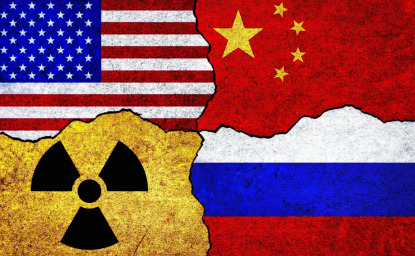by Peter Bean
While a great deal of current American foreign policy attention is focused on the Middle East, Asia Program Director Robert Hathaway says the United States must be careful not to pay attention to Asia only "episodically." Hathaway spent three weeks last May in South Asia traveling between India and Pakistan and reports that relations between the United States and both India and Pakistan are in surprisingly poor shape.
"The war on terrorism and the war in Iraq have clearly overshadowed Asia issues. The lack of urgency in dealing with critical Asia issues is a direct reflection of these other preoccupations, and people in South Asia feel that disconnect."
Following his visit to the region, which included two weeks in India and one in Pakistan, Hathaway concluded that Indians and Pakistanis alike have become increasingly frustrated with the United States and its policies abroad. American indifference toward South Asia has outraged many Pakistanis. He points out that the United States used Pakistan in the 1980s to fight the Soviet Union in Afghanistan. However, following the end of the Cold War, America turned its back on Pakistan until 2001, when Washington once again needed Pakistani aid, this time to fight the war on terror.
"They still feel like we pay attention to them episodically, when we need them, but then ignore them when their help is no longer needed. We must begin to think of South Asia as more than merely an afterthought."
In India, many are suspicious of the United States because they believe it is too closely allied to Pakistan, wields too much power in the world, and tries to assert global hegemony. "Indians are angry with, and suspicious of, the United States at an intensity I had not fully anticipated," Hathaway observes. "I thought we had crossed a psychological divide in relations with that country, but large numbers of people have not yet made that leap."
According to Hathaway, however, the most pressing problem in Asia is the yet unresolved situation involving North Korea and its pursuit of nuclear weapons. Hathaway says that North Korea still wants bilateral negotiations with the United States, though President Bush has thus far insisted on multi-party discussions that include Russia, China, South Korea, and Japan. Democratic Presidential candidate John Kerry has said, if elected, he would resume bilateral negotiations.
"I think serious engagement is inevitable," Hathaway concludes. "The specific format is of less importance. Frankly, we have no option but to engage. A military solution is off the table, sanctions will not make the problem go away, and ignoring the problem just gives the North Koreans more time to develop a nuclear arsenal. Up to this point, however, the administration has not engaged in a meaningful way. That will have to change, regardless of whether Bush or Kerry wins."
While North Korea remains the most critical issue in Asia in the short-term, Hathaway argues that the biggest challenge over the next ten years will be how the United States deals with China.
"We're going to have to manage the rise of China in such a way that encourages stability and prosperity throughout the region," Hathaway argues. "Historically, the emergence of new powers on to the world scene has often had a destabilizing impact and led to conflict."
Hathaway says the United States needs to encourage China to embrace international norms, rules and institutions, while maintaining active engagement with Beijing over a wide range of issues, including nonproliferation, the environment and human rights. Hathaway also argues the United States should encourage China to evolve politically because "a China that is moving in the direction of political liberalism is less likely to be a threat to its neighbors."
One of the most difficult challenges with regards to China is how to shape United States policy toward Taiwan. Conservatives in the United States, and many liberals as well, are calling for a change in policy that would allow senior Taiwanese officials to come to the United States on official visits. Many American politicians and analysts are also calling for expanded military ties with Taiwan. Ironically, Hathaway notes, it is the Taiwanese themselves who have been reluctant to purchase all the arms the Bush administration has sought to sell.
A number of critics are calling for an end to the United States' "one-China policy," which holds that there is only one China, which both mainland China and Taiwan are a part of. At present, the "one-China policy" is a requirement for any political entity to establish diplomatic relations with the People's Republic of China. Critics argue the policy is neither compatible with American ideals, nor in our national interest. Hathaway warns, however, that the consequence of recognizing Taiwanese independence could be a war between China and Taiwan, where the United States would be dragged in on the side of Taiwan. "Such a scenario would not be in Taiwan's interest, nor ours. It's critical we remember that patience is frequently a virtue in diplomacy."
Robert Hathaway is the director of the Wilson Center's Asia Program. He is the author of numerous books and articles, including Islamization and the Pakistani Economy, co-editor (Woodrow Wilson Center, 2004) and George W. Bush and Asia: A Midterm Assessment, co-editor (Woodrow Wilson Center, 2003). He received his Ph.D. from the University of North Carolina, Chapel Hill and his masters from Wake Forest University.
Related Links




